大学精读第二册课文第六单元
精读2 UNIT6
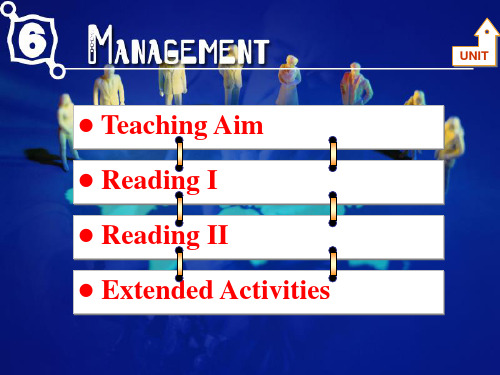
2. What is the purpose of management?
key
Management is the process of coordinating human, physical, and financial resources to achieve an organization’s objectives.
Text
Unit 6 Management
4. Management of the firm’s finances, including its investments and accounting functions, is extremely important to its survival. Nearly every company has financial managers to plan and oversee its financial resources. Levels of financial management may include a vice president for finance (top), division controller (middle), and accounting supervisor (first-line). For large financial institutions like Citicorp, Bank of America, and Merrill Lynch, effective financial management is the company’s reason for being. No organization, however, can afford to ignore the need for management in this area.
大学思辨英语教程 精读2课件Unit 6
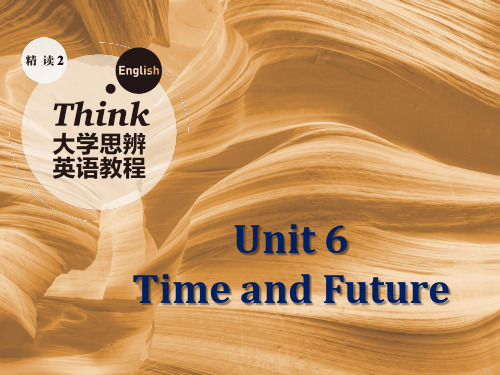
Lead in
beginning. Time changes the new and young into the old, and displays the consequences of what we have done or have not done. As young as you are now, what do you expect from the future? Take a moment to think about it both in terms of your personal life and the future of mankind.
Background Knowledge
4. Mars
Martian soil to be slightly alkaline and containing elements such as magnesium, sodium, potassium and chlorine. These nutrients are found in gardens on Earth, and they are necessary for growth of plants. That means it is possible to have some plants grow on Mars. Martian surface temperatures vary from lows of about −143 C (−225 F) at the winter polar caps to highs of up to 35 C (95 F) in equatorial summer.
Unit 6 Time and Future
August 2002: Night Meeting Ray Bradbury
大学英语精读第二册6单元课文原文

第一单元The Dinner PartyMona Gardner I first heard this tale in India, where it is told as if true —though any naturalist would know it couldn,t be. Later someone told me that the story appeared in a magazine shortly before the First World War. That magazine story, and the person who wrote it, I have never been able to track down. The country is India. A colonial official and his wife are giving a large dinner party. They are seated with their guests — officers and their wives, and a visiting American naturalist — in their spacious dining room, which has a bare marble floor, open rafters and wide glass doors opening onto a veranda.A spirited discussion springs up between a young girl who says that women have outgrown the jumping-on-a-chair-at-the-sight-of-a-mouse era and a major who says that they haven,t.“A woman,s reaction in any crisis,” the major says, “is to scream. And while a man may feel like it, he has that ounce more of control than a woman has. And that last ounce is what really counts.”The American does not join in the argument but watches the other guests. As he looks, he sees a strange expression come over the face of the hostess. She is staring straight ahead, her muscles contracting slightly. She motions to the native boy standing behind her chair and whispers something to him. Theboy,s eyes widen: he quickly leaves the room.Of the guests, none except the American notices this or sees the boy place a bowl of milk on the veranda just outside the open doors.The American comes to with a start. In India, milk in a bowl means only one thing - bait for a snake. He realizes there must be a cobra in the room. He looks up at the rafters - the likeliest place - but they are bare. Three corners of the room are empty, and in the fourth the servants are waiting to serve the next course. There is only one place left - under the table.His first impulse is to jump back and warn the others, but he knows the commotion would frighten the cobra into striking. He speaks quickly, the tone of his voice so commanding that it silences everyone.“I want to know just what control everyone at this table has. I will count three hundred - that,s five minutes - and not one of you is to move a muscle. Those who move will forfeit 50 rupees. Ready!”The 20 people sit l ike stone images while he counts. He is saying “... two hundred and eighty…" when, out of the corner of his eye, he sees the cobra emerge and make for the bowl of milk. Screams ring out as he jumps to slam the veranda doors safely shut.“You were right, Major!” the host exclaims. “A man has just shown us an example of perfect self-control.”“Just a minute,” the American says, turning to his hostess. “Mrs. Wynnes, how did you know that cobra was in the room?”A faint smile lights up the woman,s face as she r eplies: “Because it was crawling across my foot.”第二单元Lessons from JeffersonBruce Bliven 1Thomas Jefferson, the third President of the United States, may be less famous than George Washington and Abraham Lincoln, but most people remember at least one fact about him: he wrote the Declaration of Independence.2Although Jefferson lived more than 200 years ago, there is much that we can learn from him today. Many of his ideas are especially interesting to modern youth. Here are some of the things he said and wrote:3Go and see. Jefferson believed that a free man obtains knowledge from many sources besides books and that personal investigation is important. When still a young man, he was appointed to a committee to find out whether the South Branch of the James River was deep enough to be used by large boats. While the other members of the committee sat in the state capitol and studied papers on the subject, Jefferson got into a canoe and made on-the-spot observations.4You can learn from everyone . By birth and by education Jefferson belonged to the highest social class. Yet, in a day when few noble personsever spoke to those of humble origins except to give an order, Jefferson went out of his way to talk with gardeners, servants, and waiters. Jefferson once said to the French nobleman, Lafayette, “You must go into the people,s homes as I have done, look into their cooking pots and eat their bread. If you will only do this, you may find out why people are dissatisfied and understand the revolution that is threatening France.”5Judge for yourself Jefferson refused to accept other people,s opinions withou t careful thought. “Neither believe nor reject anything,” he wrote to his nephew, “because any other person has rejected or believed it. Heaven has given you a mind for judging truth and error. Use it.”6Jefferson felt that the people “may safely be trusted to hear everything true and false, and to form a correct judgment. Were it left to me to decide whether we should have a government without newspapers or newspapers without a government, I should not hesitate a moment to prefer the latter.” 7 Do what you believe is right . In a free country there will always be conflicting ideas, and this is a source of strength. It is conflict and not unquestioning agreement that keeps freedom alive. Though Jefferson was for many years the object of strong criticism, he never answered his critics. He expressed his philosophy in letters to a friend, “There are two sides to every question. If you take one side with decision and act on it with effect, those who take the other side will of course resent your actions.”8Trust the future; trust the young. Jefferson felt that the present shouldnever be chained to customs which have lost their usefulness. “No society,” he said, “can make a perpetual constitution, or even a perpetual law. The earth belongs to the living generation.” He did not fear new ideas, nor did he fear the future.” How much pain,” he remarked, “has been caused by evils which have never happened! I expect the best, not the worst. I steer my ship with hope, leaving fear behind.”9Jefferson,s courage and idealism were based on knowledge. He probably knew more than any other man of his age. He was an expert in agriculture, archeology, and medicine. He practiced crop rotation and soil conservation a century before these became standard practice, and he invented a plow superior to any other in existence. He influenced architecture throughout America, and he was constantly producing devices for making the tasks of ordinary life easier to perform.10Of all Jefferson,s many talents, one is central. He was above all a good and tireless writer. His complete works, now being published for the first time, will fill more than fifty volumes. His talent as an author was soon discovered, and when the time came to write the Declaration of Independence at Philadelphia in 1776, the task of writing it was his. Millions have thrilled to his words: “We hold these truths to be self-evident, that all men are created equal ...”11When Jefferson died on July 4, 1826, the 50th anniversary of American independence, he left his countrymen a rich legacy of ideas andexamples. American education owes a great debt to Thomas Jefferson, who believed that only a nation of educated people could remain free.第三单元My First JobRobert BestWhile I was waiting to enter university, I saw advertised in a local newspaper a teaching post at a school in a suburb of London about ten miles from where I lived. Being very short of money and wanting to do something useful, I applied, fearing as I did so, that without a degree and with no experience in teaching my chances of getting the job were slim. However, three days later a letter arrived, asking me to go to Croydon for an interview. It proved an awkward journey: a train to Croydon station; a ten-minute bus ride and then a walk of at least a quarter of a mile. As a result I arrived on a hot June morning too depressed to feel nervous.The school was a red brick house with big windows. The front garden was a gravel square; four evergreen shrubs stood at each corner, where they struggled to survive the dust and fumes from a busy main road.It was clearly the headmaster himself that opened the door. He was short and fat. He had a sandy-coloured moustache, a wrinkled forehead and hardly any hair.He looked at me with an air of surprised disapproval, as a colonel might look at a private whose bootlaces were undone. ‘Ah yes,, he grunted. ‘You,d better come inside., The narrow, sunless hall smelled unpleasantly of stale cabbage; the walls were dirty with ink marks; it was all silent. His study, judging by the crumbs on the carpet, was also his dining-room. ‘You,d better sit down,, he said, and proceeded to ask me a number of questions: what subjects I had taken in my General School Certificate; how old I was; what games I played; then fixing me suddenly with his bloodshot eyes, he asked me whether I thought games were a vital part of a boy's education. I mumbled something about not attaching too much importance to them. He grunted. I had said the wrong thing. The headmaster and I obviously had very little in common.The school, he said, consisted of one class of twenty-four boys, ranging in age from seven to thirteen. I should have to teach all subjects except art, which he taught himself. Football and cricket were played in the Park, a mile away on Wednesday and Saturday afternoons.The teaching set-up filled me with fear. I should have to divide the class into three groups and teach them in turn at three different levels; and I was dismayed at the thought of teaching algebra and geometry - two subjects at which I had been completely incompetent at school. Worse perhaps was the idea of Saturday afternoon cricket; most of my friends would be enjoying leisure at that time.I said shyly, ‘What would my salary be?’ ‘Twelve pounds a week plus lunch., Before I could protest, he go t to his feet. ‘Now’, he said, ‘you'd better meet my wife. She's the one who really runs this school., This was the last straw. I was very young: the prospect of working under a woman constituted the ultimate indignity.第四单元The Professor and the Yo-YoThomas Lee Bucky with Joseph P.Blank My father was a close friend of Albert Einstein. As a shy young visitor to Einstein,s home, I was made to feel at ease when Einstein said, “I have something to show you.” He went to his desk and returned with a Yo-Yo. He tried to show me how it worked but he couldn,t make it roll back up the string. When my turn came, I displayed my few tricks and pointed out to him that the incorrectly looped string had thrown the toy off balance. Einstein nodded, properly impressed by my skill and knowledge. Later, I bought a new Yo-Yo and mailed it to the Professor as a Christmas present, and received a poem of thanks.As a boy and then as an adult, I never lost my wonder at the personality that was Einstein. He was the only person I knew who had come to terms with himself and the world around him. He knew what he wanted and he wanted only this: to understand within his limits as a human being the natureof the universe and the logic and simplicity in its functioning. He knew there were answers beyond his intellectual reach. But this did not frustrate him. He was content to go as far as he could.In the 23 years of our friendship, I never saw him show jealousy, vanity, bitterness, anger, resentment, or personal ambition. He seemed immune to these emotions. He was beyond any pretension. Although he corresponded with many of the world,s most important people, his stationery carried only a watermark - W - for Woolworth,s.To do his work he needed only a pencil and a pad of paper. Material things meant nothing to him. I never knew him to carry money because he never had any use for it. He believed in simplicity, so much so that he used only a safety razor and water to shave. When I suggested that he try shaving cream, he said, “The razor and water do the job.”“But Professor, why don,t you try the cream just once?” I argued. “It makes shaving smoother and less painful.”He shrugged. Finally, I presented him with a tube of shaving cream. The next morning when he came down to breakfast, he was beaming with the pleasure of a new, great discovery. “You know, that cream really works, he announced. “It doesn,t pull the beard. It feels wonderful.” Thereafter, he used the shaving cream every morning until the tube was empty. Then he reverted to using plain water.Einstein was purely and exclusively a theorist. He didn,t have theslightest interest in the practical application of his ideas and theories. HisE=mc2 is probably the most famous equation in history — yet Einstein wouldn,t walk down the street to see a reactor create atomic energy. He won the Nobel Prize for his Photoelectric Theory, a series of equations that he considered relatively minor in importance, but he didn,t have any curiosity in observing how his theory made TV possible.My brother once gave the Professor a toy, a bird that balanced on the edge of a bowl of water and repeatedly dunked its head in the water. Einstein watched it in delight, trying to deduce the operating principle. But he couldn,t.The next morning he announced, “I had thought about that bird for a long time before I went to bed and it must work this way ...” He began a long explanation. Then he stopped, realizing a flaw in his reasoning. “No, I guess that,s not it,” he said. He pursued various theories for several days until I suggested we take the toy apart to see how it did work. His quick expression of disapproval told me he did not agree with this practical approach. He never did work out the solution.Another puzzle that Einstein could never understand was his own fame. He had developed theories that were profound and capable of exciting relatively few scientists. Yet his name was a household word across the civilized world. “I’ve had good ideas, and so have other men,” he once said. “But it,s been my good fortune that my ideas have been accepted.” He wasbewildered by his fame: people wanted to meet him; strangers stared at him on the street; scientists, statesmen, students, and housewives wrote him letters. He never could understand why he received this attention, why he was singled out as something special.第五单元The Villain in the AtmosphereIsaac Asimov1The villain in the atmosphere is carbon dioxide.2It does not seem to be a villain. It is not very poisonous and it is present in the atmosphere in so small a quantity — only 0.034 percent — that it does us no harm.3What,s more, that small quantity of carbon dioxide in the air is essential to life. Plants absorb carbon dioxide and convert it into their own tissue, which serve as the basic food supply for all of animal life (including human beings, of course). In the process they liberate oxygen, which is also necessary for all animal life.4But here is what this apparently harmless and certainly essential gas is doing to us:5The sea level is rising very slowly from year to year. In all likelihood, it will continue to rise and do so at a greater rate in the course of the next hundred years. Where there are low-lying coastal areas (where a largefraction of the world,s population lives) the water will advance steadily, forcing people to retreat inland.6Eventually the sea will reach two hundred feet above its present level, and will be splashing against the windows along the twentieth floors of Manhattan,s skyscrapers. Florida will disappear beneath the waves, as will much of the British Isles, the crowded Nile valley, and the low-lying areas of China, India, and Russia.7Not only will many cities be drowned, but much of the most productive farming areas of the world will be lost. As the food supply drops, starvation will be widespread and the structure of society may collapse under the pressure.8And all because of carbon dioxide. But how does that come about? What is the connection?9It begins with sunlight, to which the various gases of the atmosphere (including carbon dioxide) are transparent. Sunlight, striking the top of the atmosphere, travels right through miles of it to warm the Earth,s surface. At night, the Earth cools by radiating heat into space in the form of infrared radiation.10However, the atmosphere is not quite as transparent to infrared radiation as it is to visible light. Carbon dioxide in particular tends to block such radiation. Less heat is lost at night, for that reason, than would be lost if carbon dioxide were not present in the atmosphere. Without the smallquantity of that gas present, the Earth would be distinctly cooler, perhaps uncomfortably cool.11We can be thankful that carbon dioxide is keeping us comfortably warm, but the concentration of carbon dioxide in the atmosphere is going up steadily and that is where the villainy comes in.In 1958, carbon dioxide made up only 0.0316 percent of the atmosphere. Each year since, the concentration has crept upward and it now stands at 0.0340 percent. It is estimated that by 2020 the concentration will be nearly twice what it is now.12This means that in the coming decades, Earth,s average temperature will go up slightly. As a result, the polar ice caps will begin to melt.13Something like 90 percent of the ice in the world is to be found in the huge Antarctica ice cap, and another 8 percent is in the Greenland ice cap. If these ice caps begin to melt, the sea level will rise, with the result that I have already described.14But why is the concentration of carbon dioxide in the atmosphere steadily rising?15To blame are two factors. First of all, in the last few centuries, first coal, then oil and natural gas, have been burned for energy at a rapidly increasing rate. The carbon contained in these fuels, which has been safely buried underground for many millions of years, is now being burned to carbon dioxide and poured into the atmosphere at a rate of many tons per day.16To make matters worse, Earth,s forests have been disappearing, slowly at first, but in the last couple of centuries quite rapidly. Right now it is disappearing at the rate of sixty-four acres per minute.17Whatever replaces the forest - grassland or farms or scrub 一 produces plants that do not consume carbon dioxide at an equal rate. Thus, not only is more carbon dioxide being added to the atmosphere through burning of fuel, but as the forests disappear, less carbon dioxide is being removed from the atmosphere by plants.18But this gives us a new perspective on the matter. The carbon dioxide is not rising by itself. It is people who are burning the coal, oil, and gas. It is people who are cutting down the forests. It is people, then, who are the villains.19What is to be done?20First, we must save our forests, and even replant them.21Second, we must have new sources of fuel that do not involve the production of carbon dioxide. Nuclear power is one of them, but if that is thought too dangerous, there are other alternatives. There is the energy of waves, tides, wind, and the Earth,s interior heat. Most of all, there is the direct use of solar energy.22All of this will take time, work, and money, to be true, but nations spend more time, work, and money in order to support competing military machines that can only destroy us all. Should we object to spending lesstime, work, and money in order to save us all?第六单元The Making of a SurgeonDr. Nolen 1How does a doctor recognize the point in time when he is finally a “surgeon”? As my year as chief resident drew to a close I asked myself this question on more than one occasion.2The answer, I concluded, was self-confidence. When you can say to yourself, “There is no surgical patient I cannot treat competently, treat just as well as or better than any other surgeon” ——then, and not until then, you are indeed a surgeon. I was nearing that point.3Take, for example, the emergency situations that we encountered almost every night. The first few months of the year I had dreaded the ringing of the telephone. I knew it meant another critical decision to be made. Often, after I had told Walt or Larry what to do in a particular situation, I,d have trouble getting back to sleep. I,d review all the facts of the case and, not infrequently, wonder if I hadn,t made a poor decision. More than once attwo or three in the morning, after lying awake for an hour, I,d get out of bed, dress and drive to the hospital to see the patient myself. It was the only way I could find the peace of mind I needed to relax.4Now, in the last month of my residency, sleeping was no longer a problem. There were still situations in which I couldn,t be certain my decision had been the right one, but I had learned to accept this as a constant problem for a surgeon, one that could never be completely resolved 一 and I could live with it So, once I had made a considered decision, I no longer dwelt on it. Reviewing it wasn,t going to help and I knew that with my knowledge and experience, any decision I,d made was bound to be a sound one. It was a nice feeling.5In the operating room I was equally confident. I knew I had the knowledge, the skill, the experience to handle any surgical situation I'd ever encounter in practice. There were no more butterflies in my stomach when I opened up an abdomen or a chest. I knew that even if the case was one in which it was impossible to anticipate the problem in advance, I could handle whatever I found. I,d sweated6Nor was I afraid of making mistakes. I knew that when I was out in practice I would inevitably err at one time or another and operate on someone who didn,t need surgery or sit on someone who did. Five years earlier 一 even one year earlier 一 I wouldn,t have been able to live with myself if I had had to take sole responsibility for a mistake in judgment. Now I could. I still dreaded errors 一 would do my best to avoid them 一 but I knew they were part of a surgeon's life. I could accept this fact with calmness because I knew that if I wasn,t able to avoid a mistake, chanceswere that no other surgeon could have, either.7This all sounds conceited and I guess it is - but a surgeon needs conceit. He needs it to encourage him in trying moments when he's bothered by the doubts and uncertainties that are part of the practice of medicine. He has to feel that he,s as good as and probably better than any other surgeon in the world. Call it conceit - call it self-confidence; whatever it was, I had it.。
大学英语之泛读教程第二册unit 6
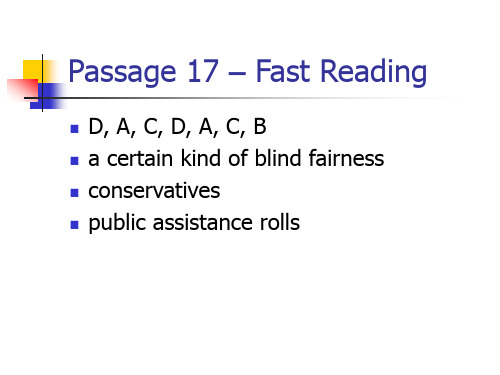
How to skim?
1. 2.
3.
Read the first one or two paragraphs so as to get an overall picture of the material; Read the key sentences (usu. the first and the last) of the paragraphs in the middle; while doing this, try to remember some important words related to the topic; Use the skill of recognizing types of paragraphs in order to save time but summarize the main idea efficiently.
Passage 17 – Fast Reading
D, A, C, D, A, C, B a certain kind of blind fairness conservatives public assistance rolls
Passage 17 – Cloze
O, B, M, L, K
Paras. 3 and 4 (Secondly) My job is to write stories that make sense and are easy and pleasant to read, but not to print word of jargon and marketing waffle that spews from your lips.
/writing1.ht m /Parenting/go od-parent.php
《大学英语精读(第二册)》Unit 6-10 习题答案
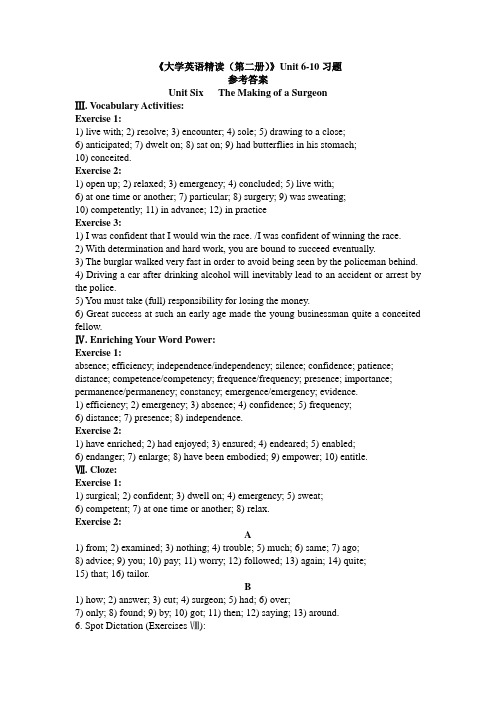
《大学英语精读(第二册)》Unit 6-10习题参考答案Unit Six The Making of a SurgeonⅢ. Vocabulary Activities:Exercise 1:1) live with; 2) resolve; 3) encounter; 4) sole; 5) drawing to a close;6) anticipated; 7) dwelt on; 8) sat on; 9) had butterflies in his stomach;10) conceited.Exercise 2:1) open up; 2) relaxed; 3) emergency; 4) concluded; 5) live with;6) at one time or another; 7) particular; 8) surgery; 9) was sweating;10) competently; 11) in advance; 12) in practiceExercise 3:1) I was confident that I would win the race. /I was confident of winning the race.2) With determination and hard work, you are bound to succeed eventually.3) The burglar walked very fast in order to avoid being seen by the policeman behind.4) Driving a car after drinking alcohol will inevitably lead to an accident or arrest by the police.5) Y ou must take (full) responsibility for losing the money.6) Great success at such an early age made the young businessman quite a conceited fellow.Ⅳ. Enriching Y our W ord Power:Exercise 1:absence; efficiency; independence/independency; silence; confidence; patience; distance; competence/competency; frequence/frequency; presence; importance; permanence/permanency; constancy; emergence/emergency; evidence.1) efficiency; 2) emergency; 3) absence; 4) confidence; 5) frequency;6) distance; 7) presence; 8) independence.Exercise 2:1) have enriched; 2) had enjoyed; 3) ensured; 4) endeared; 5) enabled;6) endanger; 7) enlarge; 8) have been embodied; 9) empower; 10) entitle.Ⅶ. Cloze:Exercise 1:1) surgical; 2) confident; 3) dwell on; 4) emergency; 5) sweat;6) competent; 7) at one time or another; 8) relax.Exercise 2:A1) from; 2) examined; 3) nothing; 4) trouble; 5) much; 6) same; 7) ago;8) advice; 9) you; 10) pay; 11) worry; 12) followed; 13) again; 14) quite;15) that; 16) tailor.B1) how; 2) answer; 3) cut; 4) surgeon; 5) had; 6) over;7) only; 8) found; 9) by; 10) got; 11) then; 12) saying; 13) around.6. Spot Dictation (Exercises Ⅷ):1) By most standards; 2) distance; 3) diseases; 4) considered;5) a different way of practicing medicine; 6) show concern for;7) stand apart from; 8) grows; 9) by my first name; 10) satisfying.Ⅸ. Translation:1) 只要你不断努力,你迟早会解决这个难题的。
现代大学英语精读第二版第六课课文分析(可编辑)
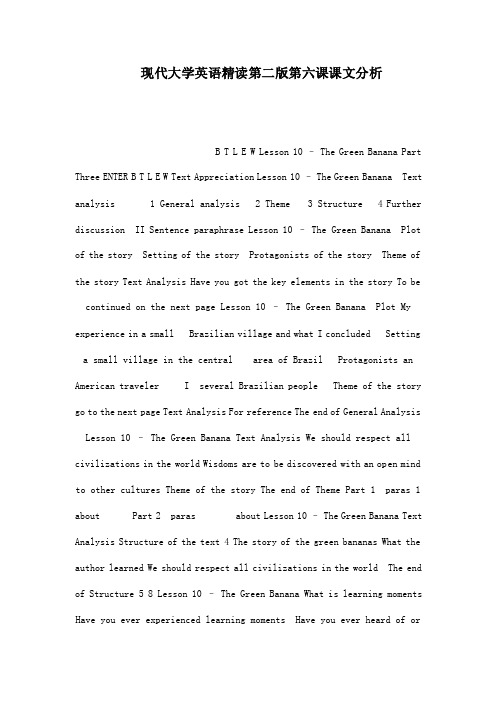
现代大学英语精读第二版第六课课文分析B T L E W Lesson 10 –The Green Banana Part Three ENTER B T L E W Text Appreciation Lesson 10 –The Green Banana Text analysis 1 General analysis 2 Theme 3 Structure 4 Further discussion II Sentence paraphrase Lesson 10 – The Green Banana Plotof the story Setting of the story Protagonists of the story Theme of the story Text Analysis Have you got the key elements in the story To be continued on the next page Lesson 10 – The Green Banana Plot My experience in a small Brazilian village and what I concluded Settinga small village in the central area of Brazil Protagonists an American traveler I several Brazilian people Theme of the storygo to the next page Text Analysis For reference The end of General Analysis Lesson 10 – The Green Banana Text Analysis We should respect all civilizations in the world Wisdoms are to be discovered with an open mindto other cultures Theme of the story The end of Theme Part 1 paras 1 about Part 2 paras about Lesson 10 –The Green Banana Text Analysis Structure of the text 4 The story of the green bananas What the author learned We should respect all civilizations in the world The endof Structure 5 8 Lesson 10 – The Green Banana What is learning moments Have you ever experienced learning moments Have you ever heard of orencountered the experience of cultural differences List the examples The occasion called for some show of recognition on my part para3 What does this sentence mean trying to show interest if not complete acceptance para3 Does the author agree with the villagers Text Analysis Further discussion about the story To be continued on the next page W Lesson 10 –The Green Banana its time had come to meet my need It was my own time that had come all in relation to it para5 It was my own time to do what Why is it in the authors opinion that many useful things remain unknown to us Who is to blame But once a conscious breakthrough to a second center is made a life-long perspective and collection can begin para7 What does he mean by the second center Which is the first center How can we make a conscious breakthrough to a second center What does he mean by perspective and collection Text Analysis Further discussion about the story To be continued on the next page Lesson 10 –The Green Banana Whats the use of green bananas in the text Text Analysis Further discussion about the story To be continued on the next page Green bananas are first used as something to stop the leak of the jeep temporarily and then as a symbol of the unknown treasures of each civilization W For Reference Lesson 10 – The Green Banana When the author says we should leave our own centers of the world does he mean we should travel to other countries more often Text Analysis Further discussion about the story To be continued on the next page The author believes that everynation has good things to offer to the rest of the world It is therefore wrong to regard any nation as inferior We should reject ethnocentrism andadopt cultural relativism For Reference in the central area of Brazilsteep mountain road jeep stopped stopped for help went on reached destination special potential of green bananas importance of the rock Cultural relativism Text Analysis To be continued on the nextpage Lesson 10 – The Green Banana Beginning Ending Cli Development learning experience paras5-8 Telling the first part of the StoryStory Narration The end of Text Analysis Text Analysis Lesson 10 –The Green Banana Lesson 10 – The Green Banana II Sentence Paraphrase 1 My ancient jeep was straining up through beautiful countryside when the radiator began to leak para 1 When the radiator started to drip my oldjeep was trying hard to climb up the mountain in the scenery rural areathe infinitive as object go to 2 to strain to try very hard radiator thepart of a car which prevents the engine from getting too hot 散热器Lesson 10 – The Green Banana II Sentence Paraphrase 2 Theover-heated engine forced me to stop at the next village which consistedof a small store and a few houses that were scattered here and there para1 Due to the high temperature of the engine I had to stop at thenext village which contained a small shop and several houses that were loosely distributed infinitive as object complement go to 3 over-heatedtoo hot consist of contain be made of Lesson 10 – The Green BananaII Sentence Paraphrase 3 He patted me on the shoulder assuring me that everything would work out para 1 He patted my shoulder confirming methat all the things would be resolved telling me that something is sureto happen or is definitely true go to 4 patted my shoulder More ExamplesTo be continued on the next page Lesson 10 –The Green Banana II Sentence Paraphrase Similarly 1 to wound sb in the leg to wound ones leg 2 tohit sb at the back to hit ones back back to 3 Lesson 10 – The Green Banana II Sentence Paraphrase 4 I did not ask them though as that would show my ignorance para 2 However I did not inquire about the reason since it would reveal my lack of knowledge go to 5 an adverbial clause of reason Lesson 10 – The Green Banana II Sentence Paraphrase 5He in turn inspected me carefully as if to make sure I grasped the significance of his statement para 3 in a proper order Then he examined me with great caution in the way of ensuring whether I understoodthe importance of his words The infinitive is used in a set constructiongo to 6 with the appearance of apparently More Examples Lesson 10 –The Green Banana II Sentence Paraphrase 1He looked as if he had seen a ghost followed by a clause 2 She cleared her throat as if to speak followedby an infinitive 3 He was standing by the window as if waiting for somebody followed by a present participle back to 5 Lesson 10 – The Green Banana II Sentence Paraphrase 6 I looked to see if he was teasingme but his face was serious para3 I looked in order to find outwhether he was joking but he seemed deeply earnest infinitive as adverbial go to 7 Lesson 10 – The Green Banana II Sentence Paraphrase 7 They then refilled my radiator and gave me extra bananas to take along in case my radiator should give me trouble again para 4 Then my radiator was filled again by them and I was provided with more bananas as a precaution my radiator should leak again infinitive as attribute go to 8 Lesson 10 – The Green Banana II Sentence Paraphrase 8 As a product of American education I had never paid the slightest attention to the green banana except to regard it as a fruit whose time had not yet come para 5 As someone educated in the United States I naturally had never paid any attention to the green banana except to take it as a fruit which was not yet ripe or which was not yet ready to be picked and eaten go to 9 The tone is humorous and self-mocking Lesson 10 –The Green Banana II Sentence Paraphrase 9 It was my own time that had come all in relation to it para 5 It was me who had come to know the green bananas and everything connected with it According to the author every civilization has special geniuses symbolized by the green banana which have existed for many years But they will not come to your notice and benefit you until and unless you are ready to go out and meet them go to 10 Lesson 10 – The Green Banana II Sentence Paraphrase 10 I had been wondering for some time about what educators like to call learning moments and I now knew I had just experienced two of them at once para5 refers to the two learning moments The two things that suddenly dawned on him are the fact that every civilization has wonderful treasure to share with others and the idea that every village town region or country has a right to regard itself as the center of the world infinitive as objectgo to 11 B T L E W。
现代大学英语精读2unit6教案
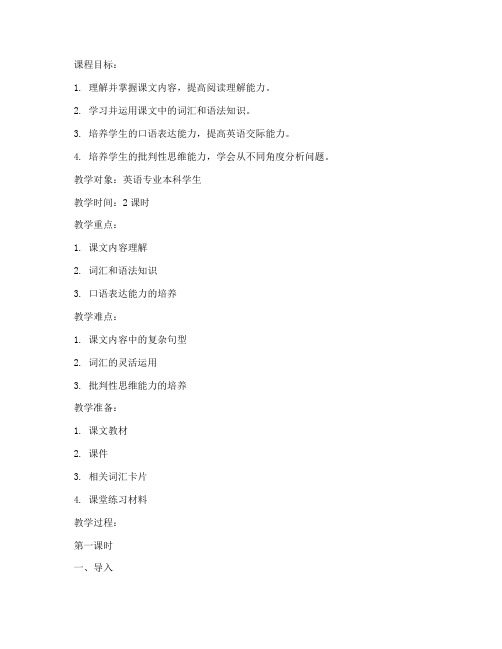
课程目标:1. 理解并掌握课文内容,提高阅读理解能力。
2. 学习并运用课文中的词汇和语法知识。
3. 培养学生的口语表达能力,提高英语交际能力。
4. 培养学生的批判性思维能力,学会从不同角度分析问题。
教学对象:英语专业本科学生教学时间:2课时教学重点:1. 课文内容理解2. 词汇和语法知识3. 口语表达能力的培养教学难点:1. 课文内容中的复杂句型2. 词汇的灵活运用3. 批判性思维能力的培养教学准备:1. 课文教材2. 课件3. 相关词汇卡片4. 课堂练习材料教学过程:第一课时一、导入1. 介绍本课的主题,激发学生的学习兴趣。
2. 引导学生回顾上一节课的内容,复习相关知识点。
二、课文阅读1. 阅读课文,了解文章大意。
2. 学生分组讨论,交流阅读感受。
三、词汇学习1. 引导学生找出课文中重点词汇,分析词性、词义和用法。
2. 通过例句和练习,让学生掌握词汇的运用。
四、语法学习1. 分析课文中出现的复杂句型,讲解语法知识。
2. 学生练习,巩固所学语法知识。
五、课堂练习1. 布置课后作业,让学生在课后巩固所学知识。
2. 学生展示作业,教师点评。
第二课时一、复习导入1. 回顾上一节课的内容,检查学生对课文的理解程度。
2. 引导学生复习词汇和语法知识。
二、口语表达1. 分组讨论,让学生运用课文中的词汇和语法知识进行口语表达。
2. 教师点评,纠正学生的错误。
三、批判性思维1. 引导学生从不同角度分析课文中的问题。
2. 学生分组讨论,提出自己的观点。
四、课堂总结1. 总结本节课的学习内容,强调重点和难点。
2. 布置课后作业,巩固所学知识。
五、课后拓展1. 建议学生阅读相关背景资料,拓宽知识面。
2. 鼓励学生参加英语角等活动,提高口语表达能力。
教学反思:本节课通过课文阅读、词汇和语法学习、口语表达和批判性思维等环节,旨在提高学生的英语综合运用能力。
在教学过程中,教师应关注学生的个体差异,因材施教,激发学生的学习兴趣。
杨立民《现代大学英语精读(2)》(第2版)学习指南【词汇短语+课文精解+全文翻译+练习答案】
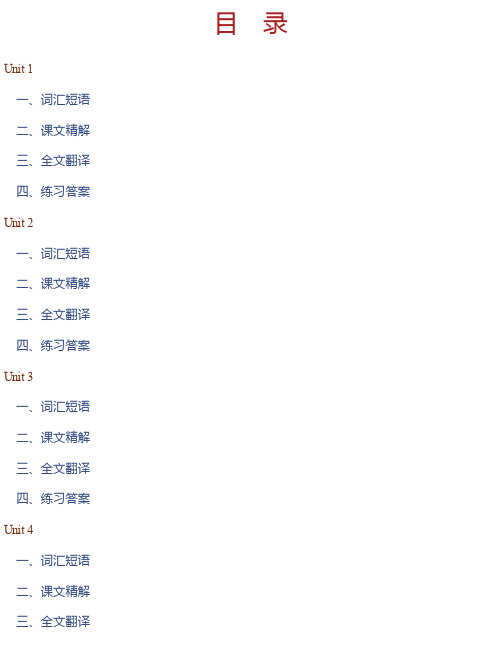
目 录Unit 1一、词汇短语二、课文精解三、全文翻译四、练习答案Unit 2一、词汇短语二、课文精解三、全文翻译四、练习答案Unit 3一、词汇短语二、课文精解三、全文翻译四、练习答案Unit 4一、词汇短语二、课文精解三、全文翻译四、练习答案Unit 5一、词汇短语二、课文精解三、全文翻译四、练习答案Unit 6一、词汇短语二、课文精解三、全文翻译四、练习答案Unit 7一、练习答案Unit 8一、词汇短语二、课文精解三、全文翻译四、练习答案Unit 9一、词汇短语二、课文精解三、全文翻译四、练习答案Unit 10一、词汇短语二、课文精解三、全文翻译四、练习答案Unit 11一、词汇短语二、课文精解三、全文翻译四、练习答案Unit 12一、词汇短语二、课文精解三、全文翻译四、练习答案Unit 13一、词汇短语二、课文精解三、全文翻译四、练习答案Unit 14一、练习答案Unit 15一、词汇短语二、课文精解三、全文翻译四、练习答案Unit 16一、词汇短语二、课文精解三、全文翻译四、练习答案Unit 1一、词汇短语Text Adisaster [di5zB:stE] n.灾难,灾祸;不幸【例句】These difficulties are caused by natural disasters. 这些困难都是由自然灾害造成的。
【助记】dis(不,没有)+aster(星星)→星星消失了,难道预示着灾难的来临?谐音“点扎死他”,灾难。
semester [si5mestE] n.学期;半年【例句】His writing has improved greatly in this semester. 这学期他的写作有了很大进步。
【助记】seme(看作semi半)+s+ ter(看作terra学期)→半学期beanpole [5bi:npEul] n.(插在地上供豆茎攀缘的)支竿,瘦长之人【例句】Li Ling’s elder sister is short and overweight while her younger sister is a beanpole.李玲的姐姐是个矮胖墩儿,可她妹妹却是个细高个儿。
大学英语精读第三版第二册unit6

4
4. Three Types of Doctors
General Practitioners Specialists Researchers
back
5
Text-learning
1. First reading 2. Further Understanding For Part I For Part II For Part III 3. Language points Questions and Answers Multiple Choice Questions and Answers
8
Multiple Choices
1. When he first became a resident, Dr. Nolen had trouble going to sleep because ____________.
KEY
A) he was not confident that he had made a right decision B) he was nervous about what would happen to other doctors C) he was waiting for the emergency call D) he was reviewing all the facts of a certain case
3
3. Do you know how many steps to become a real doctor in America?
1) to attend 4 years of college to obtain a bachelor’s degree 2) followed by 4 years of medical school 3) an intern in a hospital 4) a resident at a hospital 5) selected to be a chief resident
现代大学英语精读2unit6课后题答案

现代大学英语精读2unit6课后题答案1、He always did well at school _____ having to do part-time jobs every now and then. [单选题] *A despite ofB. in spite of(正确答案)C. regardless ofD in case of2、My father?is _______ flowers. [单选题] *A. busy watering(正确答案)B. busy waterC. busy with wateringD. busy with water3、The Chinese team are working hard _______ honors in the Olympic Games. [单选题] *A. to win(正确答案)B. winC. winningD. won4、I had _______ egg and some milk for breakfast this morning. [单选题] *A. aB. an(正确答案)C. theD. /5、( )He killed the enemy guard and made away _________the villagers. [单选题] *A. with the helpB. with helpC. with help ofD. with the help of(正确答案)6、If you want to _______, you’d better eat more healthy food and do more exercise. [单选题] *A. keep fatB. keep calmC. keep healthy(正确答案)D. keep on7、Will you please say it again? I _______ you. [单选题] *A. didn’t hear(正确答案)B. don’t heardC. didn’t heardD. don’t hear8、24.Kitty’s father ______ a policeman since 2 He loves helping people. [单选题] *A.isB.wasC.has been (正确答案)D.have been9、15.This kind of bread is terrible. I do not want to eat it ________. [单选题] *A.any more(正确答案)B.some moreC.no longerD.some longer10、John had planned to leave but he decided to stay in the hotel for _____ two days because of the heavy rain. [单选题] *A. otherB. another(正确答案)C. the otherD. others11、I’m _______ I must be leaving now. [单选题] *A. afraid(正确答案)B. thinkC. thoughtD. free12、____ wants to see you. [单选题] *A. Somebody(正确答案)B. AnybodyC. All the peopleD. No people13、Though my best friend Jack doesn’t get()education, he is knowledgeable. [单选题] *A. ManyB. littleC. fewD. much(正确答案)14、We often go to the zoo _______ Saturday mornings. [单选题] *A. atB. inC. on(正确答案)D. of15、57.Next week will be Lisa's birthday. I will send her a birthday present ________ post. [单选题] *A.withB.forC.by(正确答案)D.in16、78.—Welcome to China. I hope you'll enjoy the ________.—Thank you. [单选题] * A.tour(正确答案)B.sizeC.nameD.colour17、How lovely a day,()? [单选题] *A. doesn't itB. isn't it(正确答案)C.shouldn't itD.hasn't it18、My father always gets up early. He’s never late _______ work. [单选题] *A. toB. for(正确答案)C. onD. at19、It’s one of _______ means of transportation. [单选题] *A. cheapB. convenientC. second-handD. the most convenient(正确答案)20、There _______ no water or milk in the fridge. [单选题] *A. is(正确答案)B. areC. hasD. have21、How beautiful the flowers are! Let’s take some _______. [单选题] *A. photos(正确答案)B. potatoesC. paintingsD. tomatoes22、The red jacket is _______ than the green one. [单选题] *A. cheapB. cheapestC. cheaper(正确答案)D. more cheap23、—Is this Tony’s history book?—No, it isn’t ______.()[单选题] *A. himB. his(正确答案)C. heD. himself24、—What do you think of Animal World? —______. I watch it every day.()[单选题] *A. I don’t mind it.B. I like it.(正确答案)C. I can’t stand it.D. I don’t like it.25、The students in that university are not fewer than()in our university. [单选题] *A. the oneB. thatC. themD. those(正确答案)26、( ) _____ New York _____ London have traffic problems. [单选题] *A. All…andB. Neither….norC. Both…and(正确答案)D. Either…or27、41.—________ do you take?—Small, please. [单选题] *A.What size(正确答案)B.What colourC.How manyD.How much28、64.Would you like to drink ________?[单选题] *A.something else(正确答案)B.anything elseC.else somethingD.else anything29、_______ your help, I passed the English exam. [单选题] *A. ThanksB. Thanks to(正确答案)C. Thank youD. Thank to30、She _______ love cats, but one attacked her and she doesn’t like them anymore. [单选题]*A. got used toB. was used toC. was used forD. used to(正确答案)。
现代大学英语精读第二版book2unit6
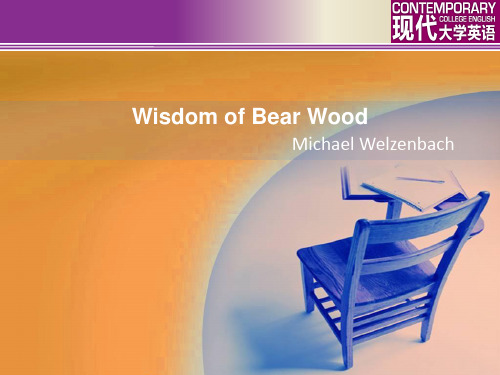
Text Analysis
Detailed Analysis
Part I: Байду номын сангаасxercise
___ through a barbed-wire fence, I’d ___ the bright sun and the ___ and ___ of insects and animals outside and ___ into another world. My own breathing ___ in my ears, and the slightest ___ of any woodland creature ___ through this private paradise.
Detailed Analysis
Part I: Sentence Paraphrase
I started hiking there …, up a long, sloping hill to an almost impenetrable stand of trees called Bear Wood. (para.4)
verge against: to be close to; to be at the edge or border of (This is a rare expression) a network of: a system of lines, wires, roads, etc that cross each other and are connected to each other
Wisdom of Bear Wood
Theme
Unit 6
Text Analysis
Structure
Detailed Analysis
大学英语精读第二册课文翻译

第一单元晚宴我最初听到这个故事是在印度,那儿的人们今天讲起它来仍好像确有其事似的----尽管任何一位博物学家都认为这不可能是真的。
后来有人告诉我,在第一次世界大战之前不久,一家杂志社曾刊登过这个故事。
但登在杂志上的那篇故事以及写故事的人,我却一直未能找到。
故事发生在印度。
某殖民地官员和他的夫人正举行盛大的晚宴。
筵席设在他们家宽敞的餐室里,室内大理石地板上没有铺地毯;屋顶明椽裸露;宽大的玻璃门外便是走廊。
跟他们一起就坐的客人有军官和他们的夫人,另外还有一位美国来访的博物学家。
席间,一位年轻的女士同一位少校展开了激烈的讨论。
年轻女士认为,妇女已经有所进步,不像以前那样一见到老鼠就吓得跳到椅子上;少校则不以为然。
他说:“一遇到危机情况,女人的反应便是尖叫。
而男人虽然也可能想叫,但比起女人来,自制力却略胜一筹。
这多出来的一点自制力就是真正起作用的东西。
”那个美国人没有参加这场争论,他只是注视着在座的其他客人。
在他这样观察时,他发现女主人脸上显出一种奇异的表情。
她两眼盯着正前方,脸部肌肉在微微抽搐,她向站在他座椅后面的印度男仆做了个手势,对他耳语了几句,男仆的眼睛睁得大大的,迅速的离开了餐室。
在座的客人中除了那位美国人谁也没注意到这一幕,也没有人看到那个男仆把一碗牛奶放在紧靠门边的走廊上。
那个美国人突然醒悟过来。
在印度,碗中的牛奶只有一个意思----引蛇的诱饵。
他意识到餐室里一定有条眼镜蛇。
他抬头看了看屋顶上的椽子----那是最可能有蛇藏身的地方。
----但那上面空荡荡的。
室内的三个角落里也是空的。
而在第四个角落里,仆人们正在等着上下一道。
这样,剩下就只有一个地方了----餐桌下面。
他首先想到的是往后一跳,并向其他人发出警告,但他知道这样会引起骚乱,致使眼镜蛇受惊咬人。
于是他很快讲了一通话,其语气非常的威严,竟使得所有的人都安静了下来。
“我想了解一下在座的诸位到底有多大的克制能力,我数三百下----也就是五分钟----你们谁都不许动一动,动者罚款五十卢比,准备好!”在他数数的过程中,那二十个人一个个都像石雕一样蹲坐在那儿,当他数到“……二百八十……”时,突然从眼角处看到那条眼镜蛇钻了出来,向那碗牛奶爬去。
大学精读2unit6教案
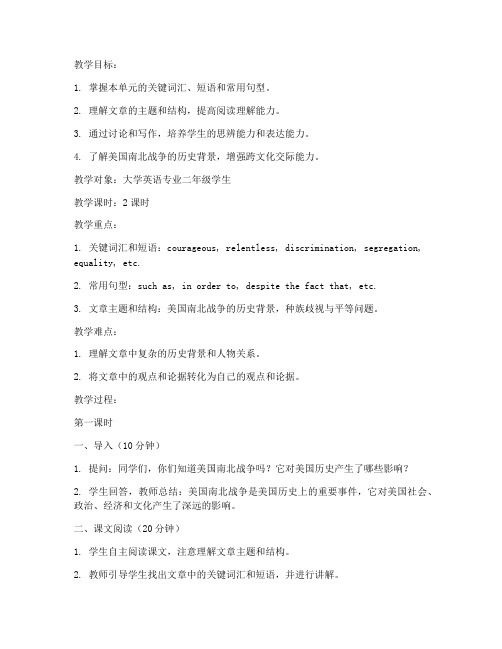
教学目标:1. 掌握本单元的关键词汇、短语和常用句型。
2. 理解文章的主题和结构,提高阅读理解能力。
3. 通过讨论和写作,培养学生的思辨能力和表达能力。
4. 了解美国南北战争的历史背景,增强跨文化交际能力。
教学对象:大学英语专业二年级学生教学课时:2课时教学重点:1. 关键词汇和短语:courageous, relentless, discrimination, segregation, equality, etc.2. 常用句型:such as, in order to, despite the fact that, etc.3. 文章主题和结构:美国南北战争的历史背景,种族歧视与平等问题。
教学难点:1. 理解文章中复杂的历史背景和人物关系。
2. 将文章中的观点和论据转化为自己的观点和论据。
教学过程:第一课时一、导入(10分钟)1. 提问:同学们,你们知道美国南北战争吗?它对美国历史产生了哪些影响?2. 学生回答,教师总结:美国南北战争是美国历史上的重要事件,它对美国社会、政治、经济和文化产生了深远的影响。
二、课文阅读(20分钟)1. 学生自主阅读课文,注意理解文章主题和结构。
2. 教师引导学生找出文章中的关键词汇和短语,并进行讲解。
三、讨论(20分钟)1. 教师提出问题,引导学生就文章主题进行讨论。
问题:文章中提到的种族歧视和隔离政策有哪些?这些政策对美国社会产生了哪些影响?2. 学生分组讨论,分享自己的观点和论据。
四、总结(10分钟)1. 教师总结讨论结果,强调文章主题和结构。
2. 引导学生认识到种族歧视和隔离政策对美国社会的危害。
第二课时一、复习(10分钟)1. 教师提问,检查学生对关键词汇、短语和句型的掌握情况。
2. 学生回答,教师点评。
二、写作(30分钟)1. 教师布置写作任务:以“种族歧视与平等”为主题,写一篇短文。
2. 学生自主写作,教师巡视指导。
三、讲评(20分钟)1. 学生展示自己的写作成果,教师点评。
现代大学英语精读2Lesson6TheManintheWater
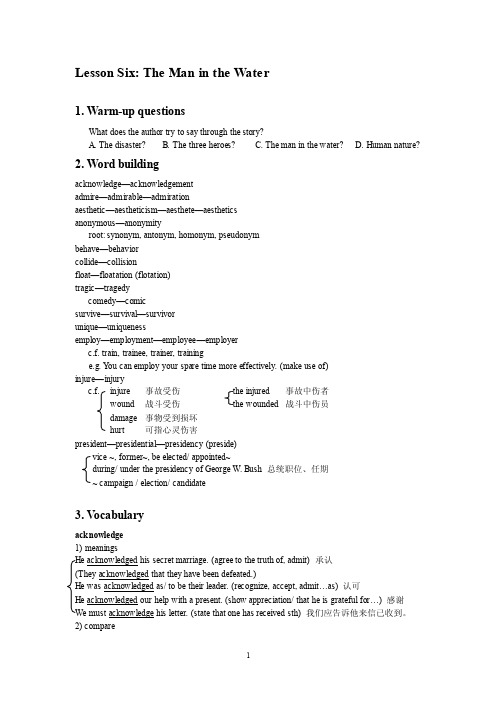
Lesson Six: The Man in the Water1. Warm-up questionsWhat does the author try to say through the story?A. The disaster?B. The three heroes?C. The man in the water?D. Human nature?2. Word buildingacknowledge—acknowledgementadmire—admirable—admirationaesthetic—aestheticism—aesthete—aestheticsanonymous—anonymityroot: synonym, antonym, homonym, pseudonymbehave—behaviorcollide—collisionfloat—floatation (flotation)tragic—tragedycomedy—comicsurvive—survival—survivorunique—uniquenessemploy—employment—employee—employerc.f. train, trainee, trainer, traininge.g. Y ou can employ your spare time more effectively. (make use of)injure—injuryc.f. injure 事故受伤事故中伤者wound 战斗受伤战斗中伤员damage 事物受到损坏hurt 可指心灵伤害president—presidential—presidency (preside)vice ~, former~, be elected/ appointed~during/ under the presidency of George W. Bush 总统职位、任期~ campaign / election/ candidate3. V ocabularyacknowledge1) meaningsHe acknowledged his secret marriage. (agree to the truth of, admit) 承认(They acknowledged that they have been defeated.)He was acknowledged as/ to be their leader. (recognize, accept, admit…as) 认可He acknowledged our help with a present. (show appreciation/ that he is grateful for…) 感谢We must acknowledge his letter. (state that one has received sth) 我们应告诉他来信已收到。
大学英语精读第二册UnitSix课文讲解

大学英语精读第二册UnitSix课文讲解大学英语精读第二册Unit Six课文讲解导语:外科医生主要是诊断外科疾病,为患者提供手术治疗的医务工作者。
下面YJBYS店铺分享一篇关于外科医生的大学英语课文,欢迎学习!A famous surgeon tells about the importance of self-confidence from his own experience.The Making of a SurgeonHow does a doctor recognize the point in time when he is finally a "surgeon"? As my year as chief resident drew to a close I asked myself this question on more than one occasion.The answer, I concluded, was self-confidence. When you can say to yourself, "There is no surgical patient I cannot treat competently, treat just as well as or better than any other surgeon" - then, and not until then, you are indeed a surgeon. I was nearing that point.Take, for example, the emergency situations that we encountered almost every night. The first few months of the year I had dreaded the ringing of the telephone. I knew it meant another critical decision to be made. Often, after I had told Walt or Larry what to do in a particular situation, I'd have trouble getting back to sleep. I'd review all the facts of the case and, not infrequently, wonder if I hadn't made a poor decision. More than once at two or three in the morning, after lying awake for an hour, I'd get out of bed, dress and drive to the hospital to see the patient myself. It was the only way I could find the peace of mind I needed to relax.Now, in the last month of my residency, sleeping was no longer a problem. There were still situations in which I couldn'tbe certain my decision had been the right one, but I had learned to accept this as a constant problem for a surgeon, one that could never be completely resolved - and I could live with it. So, once I had made a considered decision, I no longer dwelt on it. Reviewing it wasn't going to help and I knew that with my knowledge and experience, any decision I'd made was bound to be a sound one. It was a nice feeling.In the operating room I was equally confident. I knew I had the knowledge, the skill, the experience to handle any surgical situation I'd ever encounter in practice. There were no more butterflies in my stomach when I opened up an abdomen or a chest. I knew that even if the case was one in which it was impossible to anticipate the problem in advance, I could handle whatever l found. I'd sweated through my share of stab wounds of the belly, of punctured lungs, of compound fractures. I had sweated over them for five years. I didn't need to sweat any more.Nor was I afraid of making mistakes. I knew that when I was out in practice I would inevitably err at one time or another and operate on someone who didn't need surgery or sit on someone who did. Five years earlier - even one year earlier - I wouldn't have been able to live with myself if I had had to take sole responsibility for a mistake in judgment. Now I could. I still dreaded errors - would do my best to avoid them -- but I knew they were part of a surgeon's life. I could accept this fact with calmness because I knew that if I wasn't able to avoid a mistake, chances were that no other surgeon could have, either.This all sounds conceited and I guess it is - but a surgeon needs conceit. He needs it to encourage him in trying moments when he's bothered by the doubts and uncertainties that are part of the practice of medicine. He has to feel that he's as good asand probably better than any other surgeon in the world. Call it conceit - call it self-confidence; whatever it was, I had it.NEW WORDSsurgeonn. doctor who performs operations 外科医生self-confidencen. 自信心makingn. means of gaining success 成功之道residentn. 住院医生concludevt. arrive at a belief or opinion by reasoning 得出结论surgicala. of, by, or for surgery 外科的;手术的competentlyad. with the necessary skill 称职地;胜任地competenta.nearvt. approach; come closer toemergencyn. sudden and dangerous happening needing immediate action 紧急情况;急症encountervt. be faced with (difficulties, danger, etc.); meet unexpectedly 遭到;意外地遇见dreadvt. fear greatly 畏惧criticala. important at a time of danger and difficulty 紧要的;关键性的particulara. belonging to some one person, thing, or occasion 特定的casen. instance of disease or injury 病例infrequentlyad. seldom; not oftenrelaxvi. become less tense 放松relaxationn.residencyn. the last stage of a doctor's training at a hospital 高级专科住院实习(期)constanta. happening all the time; unchanging 不断的;始终如一的resolvevt. solve 解决resolutionn.considereda. carefully thought out 经过深思熟虑的dwellvi. live (in a place) 居住bounda. very likely; certain 一定的,必然的sounda. correct; based on good judgment 正确的,合理的'confidenta. sure of oneself and one's abilities 自然的confidencen.handlevt. manage, deal with 处理butterflyn. 蝴蝶abdomenn. belly 腹(部)anticipatevt. see beforehand 预期anticipationn.sweatn. 汗vi. 流汗stabn. thrust made with a pointed weapon 刺;戳bellyn. 肚,腹部puncturevt. make a small hole in (sth.) with sth. pointed 刺穿compounda. having more than one part 复合的fracturen. break in a bone 骨折compoundn. 复合性骨折inevitablyad. unavoidably 不可避免地inevitablea.errvi. make mistakes; do wrongoperatevi. perform a surgical operation 动手术surgeryn. 外科;外科手术solea. unshared; one and only 唯一的responsibilityn. 责任;责任心avoidvt. escape; keep or get away from 避免conceiteda. having too high an opinion of oneself 自负的conceitn. too high an opinion of oneselftryinga. hard to endure or bear; very difficult 难受的;恼人的bothervt. annoy, trouble 烦扰,麻烦uncertaintyn. uncertain condition; doubtPHRASES & EXPRESSIONSdraw to a closecome to an end 结束live withlearn to accept (sth. unpleasant); tolerate 学会;适应;容忍dwell onthink, write, or speak a lot about 老是想着;详述;强调(be) bound to (do)(be) certain to (do) 一定..., 必然...in practice(医师,律师等) 在开业中;在实践中butterflies in the stomachfeelings of nervousness 忐忑不安open upcut open 切开,给...开刀in advanceahead of time 预先,事前at one time or anothersometime or other 早晚sit ondelay taking action on; do nothing about 拖延;搁置PROPER NAMESNolen诺兰(姓氏)Walt沃尔特(男子名 Walter 的昵称)Larry拉里(男子 Lawrence 的昵称)。
外教社大学英语精读第2册第6单元参考答案
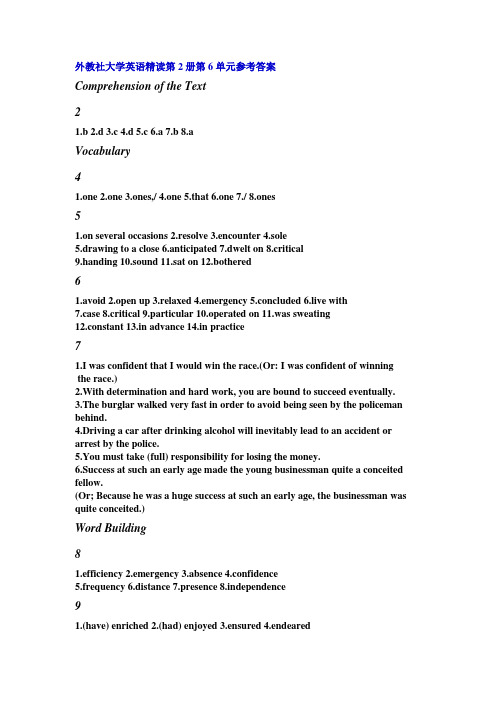
外教社大学英语精读第2册第6单元参考答案Comprehension of the Text21.b2.d3.c4.d5.c6.a7.b8.aVocabulary41.one2.one3.ones,/4.one5.that6.one7./8.ones51.on several occasions2.resolve3.encounter4.sole5.drawing to a close6.anticipated7.dwelt on8.critical9.handing 10.sound 11.sat on 12.bothered61.avoid2.open up3.relaxed4.emergency5.concluded6.live with7.case 8.critical 9.particular 10.operated on 11.was sweating12.constant 13.in advance 14.in practice71.I was confident that I would win the race.(Or: I was confident of winningthe race.)2.With determination and hard work, you are bound to succeed eventually.3.The burglar walked very fast in order to avoid being seen by the policeman behind.4.Driving a car after drinking alcohol will inevitably lead to an accident or arrest by the police.5.You must take (full) responsibility for losing the money.6.Success at such an early age made the young businessman quite a conceited fellow.(Or; Because he was a huge success at such an early age, the businessman was quite conceited.)Word Building81.efficiency2.emergency3.absence4.confidence5.frequency6.distance7.presence8.independence91.(have) enriched2.(had) enjoyed3.ensured4.endeared5.enable6.endanger7.enlarge8.have been embodied9.empower 10.entitleStructure101.Once a good beginning is made2.Once you understand these rules3.Once he makes a promise4.Once (they are) put down in black and white5.Once you get into the habit of smoking6.Once she began to write in English111.I had a lot of trouble getting the car started this morning.2.You won't have much difficulty getting to know people in Italy.3.The conceited young man said he had no difficulty whatsoever reading technical drawings.4.To the teacher's surprise, most of the students in his class had little difficulty working out the hard maths problems.5.Did you have any trouble finding the butterfly specimen Prof. Nolen wanted?6.The shepherds had a great deal of trouble driving the sheep to a place of safety in the snowstorm.121.Einstein is so famous that there is no one (who) doesn't know him.2.There is almost nothing (that) his dog won't eat.3.There is no one (who) doesn't make any mistakes in his lifetime.4.There is no goal (that) you cannot obtain so long as you have an honest attitude and a strong will.5.There is nobody here (who) won't lend you a helping hand when you find yours elf in difficulty.6.John is called Mr.Fix. It because there is almost nothing that he cannot fix. Cloze13(A)1)surgical 2)confident 3)sound 4)case 5)dwell on 6)emergency7)sweat 8)competent 9)bound 10)or another 11)relax 12)handle(B)1.1)from 2)examined 3)nothing 4)trouble 5)much 6)same 7)ago8)advice 9)you 10)pay 11)worry 12)followed 13)again14)quite 15)that 16)tailor2.1)how 2)answer 3)cut 4)surgeon 5)had 6)over 7)only 8)found9)by 10)got 11)then 12)saying 13)aroundTranslation141.If/As long as you keep (on) trying, you will be able to resolve this difficult problem at one time or another(sooner or later.)2.We anticipate encountering/that we will encounter resistance to our plan/our plan will meet (with) resistance.3.Jim's friends said that the noise pollution in their city was terrible, but they had to live with it.4.At first Tom thought that with his knowledge, skill and experience he was bound to find a satisfactory job.5.It would be wise (advisable) to handle this delicate problem with calmness and patience.6.Dick thought that if he wasn't able to take the machine apart, chances were that no other worker in the plant could,either.7.Do you think bus drivers should take full responsibility for the passengers'safety?8.You needn't dwell on your mistakes in judgement any more. What's important is to try your best to avoid repeating them.Key to Reading ActivityExercise A1.d2.c3.c4.b5.d6.a7.cExercise B1.我倒认为,凡是当医生的全都倒了霉。
现代大学英语精读第二册第二版课后翻译以及中文1-8单元

.Unit21 我跟你说,从各方面考虑,当教师不失为一个好主意。
事实上,我认为这个主意好极了。
You know what ?All things considered,it’s not a bad idea to be a teacher. As a matter of fact,I think it is an excellent idea.2我不大喜欢你像刚才那样用讽刺的口气说话。
你好像老是在暗示,我是什么都不会的废物。
I don’t like it when you take a sarcastic tone the way you just did . You seem tobe implying all the time that I am a good-for-nothing.3我爸能让我作最后决定,真是很体谅人。
我得说我够幸运。
不是很多人都有这么好的父亲。
It is really considerate of my father to leave the final decision to me . I must sayI am very lucky.Not many people have such a terrific father.4你说你不要钱。
你可能不愿要,但你的确需要钱。
我看不出来大学生在课余时间挣点钱有什么错。
You said you do not want any money .You may not want money ,but you do need money .I don’t see what’s wrong with students earning some money during their spare time.5不知道为什么,这个曲调听起来很熟,但我就是记不起来了。
反正是一首俄罗斯民歌。
Somehow this tune sounds very familiar, but I can’t recall what it is. In anycase ,It is a Russian folk song.6除了一贯的周末家务,我明天还有一大堆家庭作业要做。
《大学英语精读》第三版第2册Unit_6 PPT
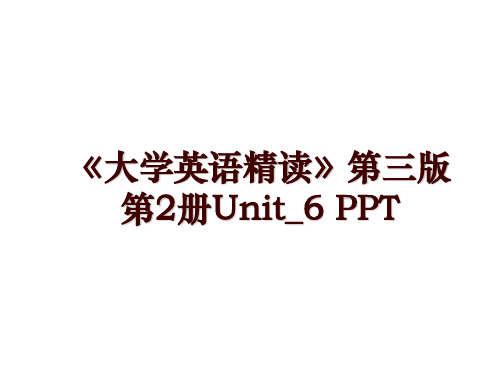
Text interpretation
▪ Warm-up questions 1. Self-confidence is the first requisite to
great undertakings. What is your comment? 2. Are you a self-confident person? 3. How can a diffident person become selfconfident?
记叙文 说明文 描述文 议论文
Text interpretation
▪ What is the main idea of the text?
✓ A famous surgeon tells about the importance of self-confident from his own experience.
Text interpretation
▪ Answer the questions
Ⅱ Comprehension 2 on p.144
▪ What type is the text, generally?
A. narration B. exposition C. description D. argumentation
▪ A confidence man ▪ 骗子,欺诈者
Useful expressions
▪ 预支收入 ▪ 简单/不费力 ▪ 背后捅刀 ▪ A belly laugh ▪ 肺穿孔 ▪ 人非圣贤 ▪ 独家代理
▪ Anticipate one’s income
▪ No sweat. ▪ Stab sb. in the back ▪ 捧腹大笑 ▪ A punctured lung ▪ To err is human. ▪ Sole agent
大学英语之泛读教程第二册unit 6
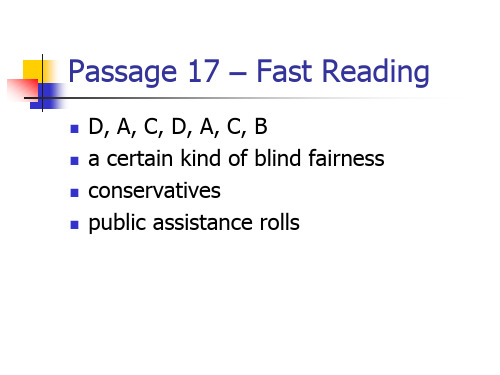
Careful Reading – Passage 17
What and how?
What – Descriptions of the author’s job How – enumeration
Paras. 1 and 2: (Firstly)
My job is to provide relevant, factually accurate information, but not to make an advertisement for you.
How to skim?
1. Read the first one or two paragraphs so as to get an overall picture of the material;
2. Read the key sentences (usu. the first and the last) of the paragraphs in the middle; while doing this, try to remember some important words related to the topic;
Text 1: Discussion
1. What makes a good parent? 2. What makes a good child?
What makes a good parent? (By advisor) 1. Provide unconditional encouragement
In Britain, national parks are quite different. Parks such as the Lake District, Dart Moor and Exmore include towns and villages where large numbers of people live. Much of the land in these national parks is privately owned, but there are strict controls on its use, and on the appearance of the landscape and buildings, some of which (including whole villages) are heritage items. This style of national park is well suited to the scenic areas of Britain where human influences such as houses, farms and fields are part of the beauty, and combine with natural scenery to produce an overall attractiveness.
- 1、下载文档前请自行甄别文档内容的完整性,平台不提供额外的编辑、内容补充、找答案等附加服务。
- 2、"仅部分预览"的文档,不可在线预览部分如存在完整性等问题,可反馈申请退款(可完整预览的文档不适用该条件!)。
- 3、如文档侵犯您的权益,请联系客服反馈,我们会尽快为您处理(人工客服工作时间:9:00-18:30)。
The Making of a Surgeon (外科医师的成功之道)How does a doctor recognize the point in time when he is finally a "surgeon"? As my year as chief resident drew to a close I asked myself this question on more than one occasion.一位医生怎样辨认自己终于成了一名“外科医师”的那一时刻呢?在我任住院主任医师的那一年快要结束的时候,我曾不止一次地问过自己这个问题。
The answer, I concluded, was self-confidence. When you can say to yourself, "There is no surgical patient I cannot treat competently, treat just as well as or better than any other surgeon" —then, and not until then, you are indeed a surgeon. I was nearing that point.我最后认定,问题的答案在于“自信”二字。
当你能够对自己说:“任何外科病人我都能胜任进行治疗,我的治疗跟其他外科医生一样高明,甚至比任何外科医生都更为高明”——那时,而且只有到了那时,你才真正成了一名外科医师。
当时我正接近那个时刻。
Take, for example, the emergency situations that we encountered almost every night. The first few months of the year I had dreaded the ringing of the telephone. I knew it meant another critical decision to be made. Often, after I had told Walt or Larry what to do in a particular situation, I'd have trouble getting back to sleep. I'd review all the facts of the case and, not infrequently, wonder if I hadn't made a poor decision. More than once at two or three in the morning, after lying awake for an hour, I'd get out of bed, dress and drive to the hospital to see the patient myself. It was the only way I could find the peace of mind I needed to relax.就以我们几乎每晚都会碰到的急诊情况为例吧。
在那一年的最初几个月,我一直害怕听到电话铃响。
我知道电话铃声意味着又要作出一个生死攸关的决定。
事情往往是这样:在我告诉沃尔特或拉里对于某一特殊情况应如何处理之后,我就很难再重新入睡了。
我会重温那位急诊病人的整个病情,常常会怀疑自己是否作出了不妥的决定。
不止一次,在我躺了一个小时还睡不着之后,我会在凌晨两三点钟从床上跳起来,穿好衣服,驾车去医院亲自探视病人。
唯有这样我才能找到安心休息所需要的内心平静。
Now, in the last month of my residency, sleeping was no longer a problem. There were still situations in which I couldn't be certain my decision had been the right one, but I had learned to accept this as a constant problem for a surgeon, one that could never be completely resolved -- and I could live with it. So, once I had made a considered decision, I no longer dwelt on it. Reviewing it wasn't going to help and I knew that with my knowledge and experience, any decision I'd made was bound to be a sound one. It was a nice feeling.然而,在我做住院医生的最后一个月,睡眠已不再是个问题了。
在有些情况下我仍然不能确定自己的决定是否正确,但我已学会把这看做一个外科医师经常会遇到的问题,一个永远也不能完全解决的问题——我已能适应它了。
所以,我一旦经过深思熟虑作出某个决定,就不再去多想它了。
多想也不会有什么帮助,而且我知道,凭我的知识和经验,我作出的任何决定肯定都是稳妥的。
这是一种令人愉快的感觉。
In the operating room I was equally confident. I knew I had the knowledge, the skill, the experience to handle any surgical situation I'd ever encounter in practice. There were no more butterflies in my stomach when I opened up an abdomen or a chest. I knew that even if the case was one in which it was impossible to anticipate the problem in advance, I could handle whatever I found. I'd sweated through my share of stab wounds of the belly, of punctured lungs, of compound fractures. I had sweated over them for five years. I didn't need to sweat any more.在手术室里我也同样充满信心。
我知道自己的知识、技术和经验足以对付我在开业行医中将会碰到的任何外科病例。
当我切开病人的腹部或胸腔时,我不再紧张得瑟瑟发抖了。
我知道,即使碰上事先无法预见其问题所在的病例,我也能处置我发现的任何情况。
我战战兢兢地治疗过交在我手上的腹部刺伤、肺部穿孔以及复合性骨折等病例。
这类外科手术我已经战战兢兢地干了五年。
我再也不必担惊受怕了。
Nor was I afraid of making mistakes. I knew that when I was out in practice I would inevitably err at one time or another and operate on someone who didn't need surgery or sit on someone who did. Five years earlier — even one year earlier — I wouldn't have been able to live with myself if I had had to take sole responsibility for a mistake in judgment. Now I could. I still dreaded errors — would do my best to avoid them — but I knew they were part of a surgeon's life.I could accept this fact with calmness because I knew that if I wasn't able to avoid a mistake, chances were that no other surgeon could have, either.而且,我也不再怕犯错误了。
我知道在我出去开业行医时,说不定什么时候我就会不可避免地出差错;我会给不需要手术治疗的病人开刀,也可能会把需要动手术的病人忽略过去。
五年前——甚至一年前——如果我不得不为一次判断上的失误负全部责任的话,我是没法容忍自己的。
现在我能了。
我仍然害怕犯错误——愿意竭尽全力避免出错——但我知道这是外科医师生活的一部分。
我之所以能够平静地接受这一事实,是因为我知道:如果我不能避免出差错,那么换了任何别的外科医生很可能也不能避免。
This all sounds conceited and I guess it is — but a surgeon needs conceit. He needs it to encourage him in trying moments when he's bothered by the doubts and uncertainties that are part of the practice of medicine. He has to feel that he's as good as and probably better than any other surgeon in the world. Call it conceit — call it self-confidence; whatever it was, I had it.这些话听上去很自负,而且我以为这的确是自负——但外科医师就是需要这种自负。
当他受到行医中必定会遇到的重重疑虑的煎熬时,他需要“自负”来支撑自己度过这些难受的时刻。
他必须觉得,他与世上任何一位外科医生相比都毫不逊色,甚至还技高一筹。
